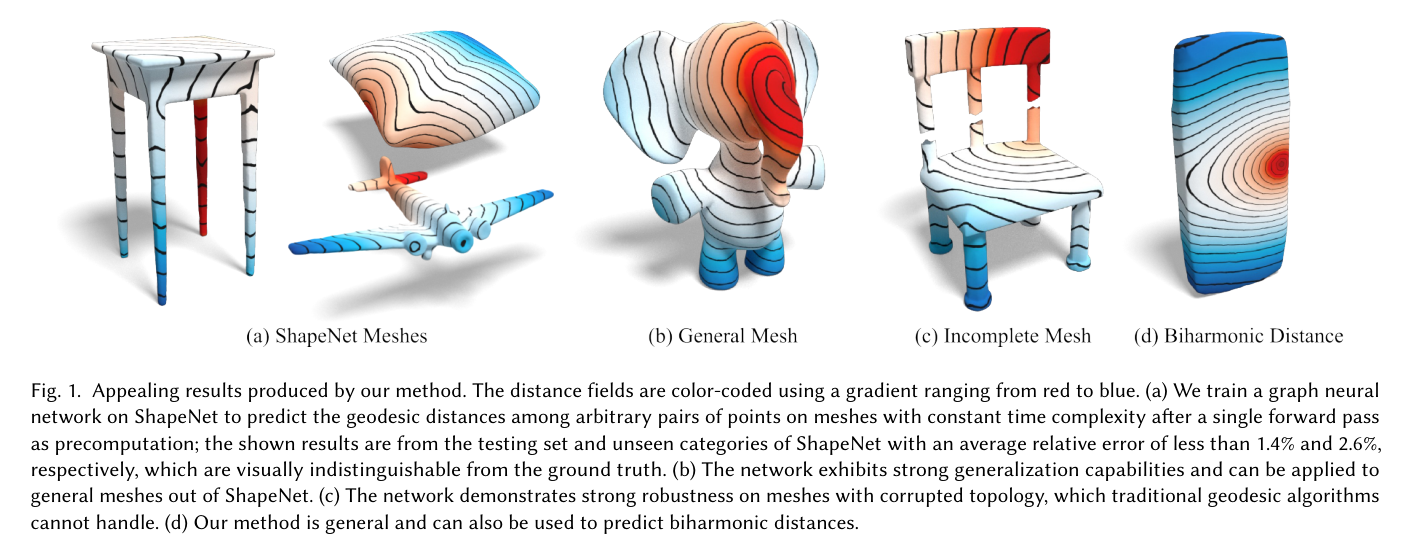Learning the Geodesic Embedding with Graph Neural Networks
Bo Pang, Zhongtian Zheng, Guoping Wang, and Peng-Shuai Wang
ACM Transactions on Graphics (SIGGRAPH Asia), 42(6), 2023
First, please install pytorch that fits your cuda version.
Then, install torch geometric:
conda install pyg -c pyg
Then install the packages required by this project:
pip3 install -r requirements.txt
Before training, you have to generate training data, as described in 4.1 of the paper. Please note the model may not generalize well on shapes very different from the training data, as suggested in the paper.
Suppose you have your meshes in path/to/meshes, we provide a script to generate training data from these meshes. Please open utils/dataset_prepare/py_data_generator.py, and change the following lines:
PATH_TO_MESH = "path/to/your/mesh/folder/"
PATH_TO_OUTPUT_NPZ = "path/to/your/output/folder/"
PATH_TO_OUTPUT_FILELIST = "path/to/your/another/output/folder"Then, please run the script:
python utils/dataset_prepare/py_data_generator.py
This will load meshes (.obj files) and generate the processed .npz files. You can change a, b, c, d in that file to adjust the property of training data.
We will upload the processed data we used in our paper to Google Drive soon.
There is also a mesh processing script in utils/dataset_prepare/simplifiy.py, which is a utility tool we used to process the meshes.
To train the network, you can type:
python3 GnnDist.py --config configs/gnndist_test.yamlWe train our model on Ubuntu 20.04 (4 Nvidia 3090 GPUs, 24GB VRAM) with batch size 10. If your GPU memory is not enough, please reduce the batch size in the config file.
A checkpoint of our model is provided in pretrained/ours00500.solver.tar.
We provide a script to test the network and visualize the results. The following command tests our method on the specified mesh and will open a polyscope window for visualization. (If you are using ssh and cannot open the window, please delete polyscope-related code in GeGnn_standalong.py.)
Feel free to change --test_file to test on other meshes and change --start_pts to test on different source points.
python3 GeGnn_standalong.py --mode SSAD --test_file data/test_mesh/bunny.obj --ckpt_path pretrained/ours00500.solver.tar --start_pts 0 --output out/ssad_ours.npyThis will open a polyscope window and show the results.
If you find this project useful for your research, please kindly cite our paper:
@article{pang2023gegnn,
title={Learning the Geodesic Embedding with Graph Neural Networks},
author={Pang, Bo and Zheng, Zhongtian and Wang, Guoping and Wang, Peng-Shuai},
journal={ACM Transactions on Graphics (SIGGRAPH Asia)},
year={2023}
}If you have any questions, please feel free to contact us at [email protected]

